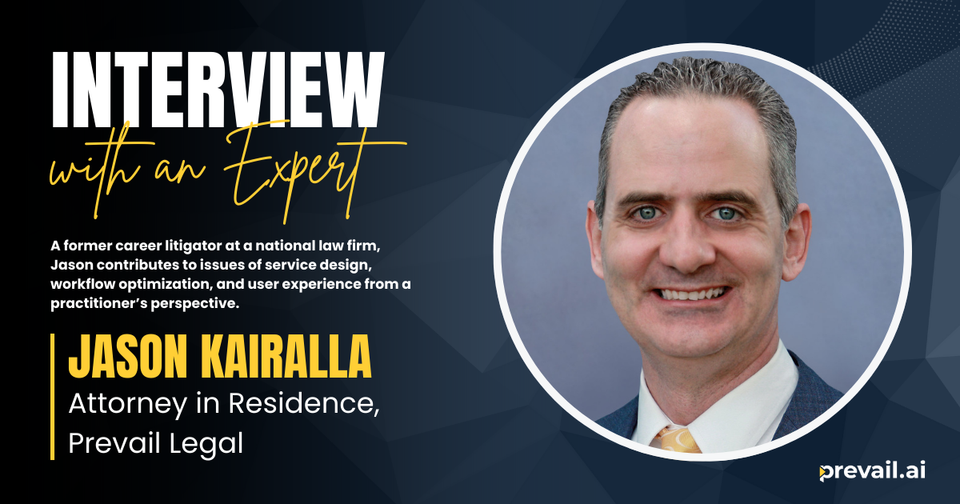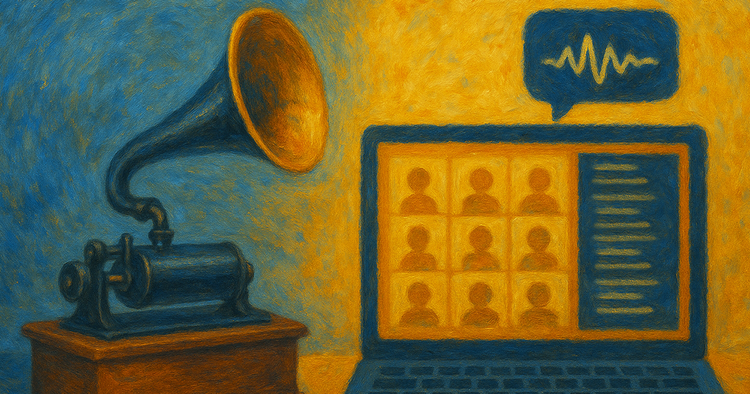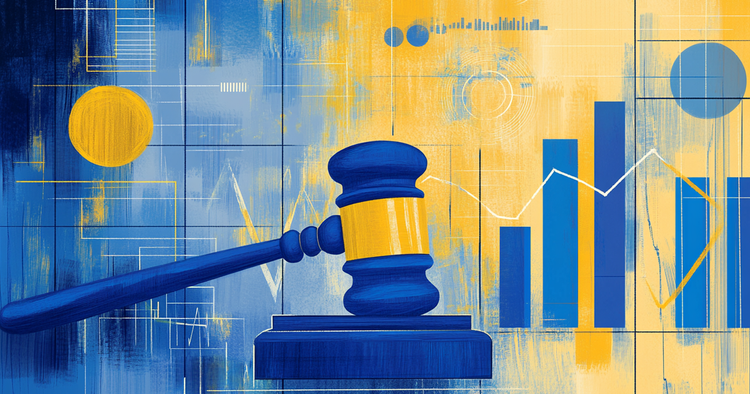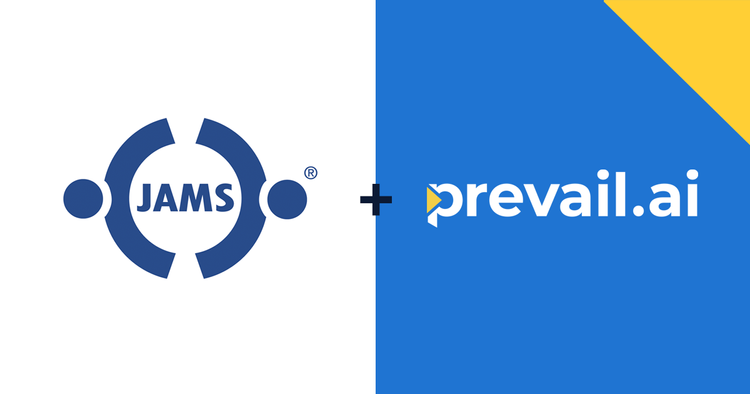Interview with an Expert: Jason Kairalla on Transforming Legal Proceedings

When legal powerhouse Jason Kairalla traded his case files for code at Prevail, he didn't leave the law behind—he set out to transform it. As Prevail's Attorney-in-Residence, this seasoned litigator now channels years of firsthand experience navigating the complexities of national litigation into revolutionizing how attorneys interact with technology. In this candid conversation, Kairalla pulls back the curtain on the seismic shifts reshaping legal proceedings, offers an insider's perspective on the role of AI in tomorrow's legal practice, and reveals how the right technology doesn't just streamline workflows—it fundamentally changes how attorneys serve their clients and pursue justice.
Q: From your perspective as someone who's been both a practicing attorney and now works in legal tech, what are the most significant changes you've witnessed in how legal proceedings are conducted over the past five years?
The most exciting things happening in legal proceedings right now are what [Prevail is] bringing to the table with regard to testimony intelligence. Document discovery, or eDiscovery, has matured with advanced tools and technology-assisted review processes. But testimonial discovery remained stagnant. Until now. We're putting testimony in the hands of lawyers and clients faster, eliminating the time between taking testimony and making meaningful use of it.
Q: Having sat in on numerous Prevail deposition sessions, what patterns have you observed in how attorneys adapt to remote proceedings? What separates those who excel from those who struggle?
Lawyers who embrace a digital-first environment excel. They don’t just try to replicate an in-person experience online. They leverage digital tools like machine learning, generative AI, and paperless exhibits. They understand that technology grants them superpowers—like Batman with a utility belt. The real winners are those who assess when remote, hybrid, or in-person proceedings are appropriate and apply the right tools to each situation.
Q: How has your experience as a complex litigation attorney shaped your approach to solving operational challenges at Prevail?
My role at Prevail is being in the shoes of the user. My experience as a litigator allowed me to bring the frustrations of traditional deposition processes into the design and development of Prevail. I knew firsthand what was inefficient and how technology could improve those processes. For example, I remember a case where an in-house attorney with niche expertise had to fly across the country to participate in key depositions. Now, with Prevail, that same expert can fully participate remotely, with access to exhibits, real-time annotation, and immediate post-session analysis.
Q: Remote legal proceedings have become more commonplace since 2020. What aspects of remote depositions do you believe will remain permanent fixtures in the current legal landscape, and what do you think might revert to pre-pandemic norms?
We’re never going back. While in-person proceedings will always be an option, remote proceedings have demonstrated tremendous value. In many circumstances, depositions, mediations, arbitrations, hearings, and even trials can be conducted more efficiently and cost-effectively. Judges and attorneys appreciate the convenience, and clients benefit from the flexibility and reduced costs.
Q: What's the most surprising insight you've gained about the legal industry while viewing it from the technology side rather than as a practicing attorney?
I was surprised by how diverse the legal profession is. Even within litigation, there are countless types of cases and lawyers with different perspectives. Engaging with advocates from all sides has made me fall even more in love with the law and has deepened my appreciation for the dedication lawyers have to their clients and the interests of justice.
Q: What questions or concerns do you hear most frequently from attorneys about adopting new technology?
There’s a general confusion about the difference between traditional AI (like speech-to-text or predictive coding) and generative AI. Traditional AI is tried and tested, but generative AI is still new and raises concerns about data security, vendor reliability, and maintaining compliance with industry best practices. One of our roles at Prevail is helping attorneys understand these nuances and providing a secure, vetted platform they can trust.
Q: How will AI transform the practice of law in the next 3-5 years, particularly in areas like depositions and court reporting?
AI will become more powerful and less expensive, allowing more lawyers to take advantage of these tools. Lawyers who develop a hybrid skillset—combining traditional legal expertise with digital proficiency—will become indispensable. Understanding how and when to deploy these technologies will be as critical as mastering traditional legal skills.
Q: Based on your experience spanning both traditional legal practice and legal tech, what skill sets do you think tomorrow's successful attorneys need to develop that weren't emphasized in your legal education?
Tomorrow’s successful attorneys will need to be modern legal advocates, blending classic legal skills with digital literacy. The most important tool you can have as a lawyer are classic legal skills. However, proficiency in case law and legal writing is not enough—you need to know how to leverage technology to better serve your clients. Lawyers who understand this hybrid skillset will set themselves apart.
Q: How does Prevail enhance access to justice for underserved communities?
Prevail empowers practitioners and court systems to conduct legal proceedings faster and more efficiently, ultimately benefiting the litigants and the interest of justice overall. By reducing costs and streamlining workflows, we help ensure that even clients with limited resources receive high-quality legal representation.
Q: What role can generative AI play in improving deposition and case management workflows?
Generative AI can analyze massive amounts of data, surface insights, and reduce inefficiencies. It enables lawyers to identify key themes, prioritize testimony, and manage complex caseloads more easily. This technology is a game-changer, allowing lawyers to operate at a level of efficiency that was previously unimaginable.
Q: What is the biggest misconception about how technology impacts the role of court reporters?
Prevail supports both stenographers and digital deposition personnel, empowering them to leverage next-generation tools for fast, accurate transcript creation while providing an elite level of service. These professionals play an essential role in the legal ecosystem, and our platform enhances their capabilities rather than replacing them.
Q: If you could redesign one aspect of how depositions or court proceedings currently function to make them more efficient or effective, what would it be and why?
One focus right now is reducing or eliminating the inefficiencies surrounding the administration of proceedings—from scheduling resources to creating meeting links to communicating outcomes and deliverables back into case management systems. With Prevail, we’ve streamlined this entire process, creating massive efficiencies while allowing firms and court administrators to focus on the substance of their work rather than logistical headaches.
Pioneering the Advancement of Legal Tech
Jason Kairalla's journey from courtroom litigator to legal tech innovator exemplifies the evolution happening across the legal sector. His unique perspective bridges traditional practice and cutting-edge technology, offering a blueprint for how attorneys can embrace innovation without compromising their core mission of justice. At the intersection of legal expertise and technological advancement, Prevail is creating tools that don't just incrementally improve legal workflows—they fundamentally transform how testimony is captured, analyzed, and leveraged for client success. As Jason passionately states, "Get off the status quo, get into Prevail, and help shape the future with us."
Stay tuned for future installments of Interview with an Expert, where we'll continue to explore cutting-edge developments in legal tech from an insider’s perspective.




